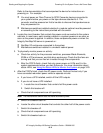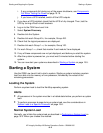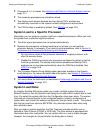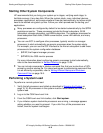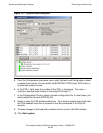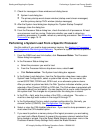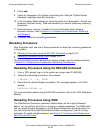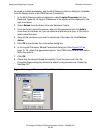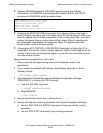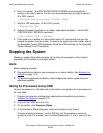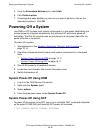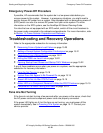
Starting and Stopping the System
HP Integrity NonStop NS-Series Operations Guide—529869-005
15-12
Reloading Processors
8. Click Load.
9. Check for messages in the System Load dialog box. After the “System Startup
Complete” message, close the dialog box.
10. In the Processor Status dialog box, check the status of all processors. At least one
processor must be running. Determine whether you need to reload any remaining
processors.
11. Dump processor memory, if needed. For more information about dumping
processor memory, refer to Section 9, Processors and Components: Monitoring
and Recovery.
12. If needed, reload any remaining processors.
Reloading Processors
After the system load, use one of these procedures to reload the remaining processors
in the system:
•
Reloading Processors Using the RELOAD Command on page 15-12
•
Reloading Processors Using OSM on page 15-12
To reload a halted processor and perform memory dumps, use the reload procedures
in Section 9, Processors and Components: Monitoring and Recovery.
Reloading Processors Using the RELOAD Command
1. From a TACL prompt, log on to the system as a super user ID (255,255).
2. Reload the remaining processors. For example:
> RELOAD (01 - 15), PRIME
3. Check that the reload initiated successfully. This message appears in the TACL
window:
PROCESSOR RELOAD: nn
For more information about using the RELOAD command, refer to the TACL Reference
Manual.
Reloading Processors Using OSM
The OSM Service Connection provides a Reload action on the Logical Processor
object. You can perform the action on a single or multiple processors. The OSM action
lets you reload an entire processor or omit a Blade Element from the reload action so
you can dump the PE for that Blade Element before reintegrating it into the running
processor. To reload a single processor, see Section 9, Processors and Components:
Monitoring and Recovery.



